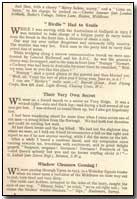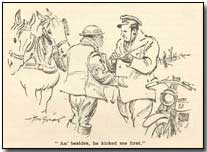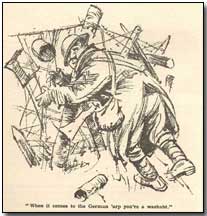Memoirs & Diaries - The Best 500 Cockney War Stories - Their Very Own Secret and Other Stories
 Published in London
in 1921, The Best 500 Cockney War Stories
comprised, in the words of its newspaper publisher (The London Evening
News) "a remembering and retelling of those war days when laughter
sometimes saved men's reason".
Published in London
in 1921, The Best 500 Cockney War Stories
comprised, in the words of its newspaper publisher (The London Evening
News) "a remembering and retelling of those war days when laughter
sometimes saved men's reason".
The collection of short memoirs, some 500 in total, is divided into five categories - Action, Lull, Hospital, High Seas and Here and There. This page contains five stories from Lull, led by Their Very Own Secret.
Other sections within the collection can be accessed using the sidebar to the right.
Their Very Own Secret
We were on a forced march to a sector on Vimy Ridge. It was a wicked night - rain and thick fog - and during a halt several of our men got lost. I was ordered to round them up, but I also got hopelessly lost.
I had been wandering about for some time when I came across one of our men - a young fellow from the Borough. We had both lost direction and could do nothing but wait.
At last dawn broke and the fog lifted. We had not the slightest idea where we were, so I told my friend to reconnoitre a hill on the right and report to me if he saw anyone moving, while I did the same on the left.
After a while I heard a cautious shout, and my companion came running towards me, breathless with excitement, and in great delight gasped, "Sergeant, sergeant! Germans! Germans! Fousands of 'em - and there's nobody but you and me knows anyfing abaht it!"
G. Lidsell (late Devon Regt.), Brixton, S.W.9
Window Cleaners Coming!
We were passing through Ypres, in 1915, in a Wolseley Signals tender when we came upon a battalion of the Middlesex on their way out to rest, very tired and very dirty.
Our cable cart ladders, strapped to the sides of the lorry, caught the eyes of one wag.
"Blimey, boys," he cried, "we're orl right nah; 'ere comes the blinkin' winder-cleaners.
"Sigs.," Haslemere, Surrey
First Blow
It was outside Albert, during the Somme attack, that I met a lone Army Service Corps wagon, laden with supplies. One of the horses was jibbing, and the driver, a diminutive Cockney, was at its head, urging it forward.
As I approached I saw him deliberately kick the horse in the flank.
I went up to the man and, taking out notebook and pencil, asked him for his name, number, and unit, at the same time remonstrating with him severely.
"I wasn't doin' 'im no 'arm," pleaded the man; "I've only got my gum-boots on, and, besides, 'e kicked me first."
I tore up my entry, mounted my motor-cycle, and left an injured-looking driver rubbing a sore shin.
R. D. Blackman (Capt., R.A.F.), 118 Abbey Road, St. John's Wood, N.W.6
M.M. (Mounted Marine)
After riding for several hours one wet, windy, and miserable night, with everyone soaked to the skin and fed up generally, we were halted in a field which, owing to the heavy rain, was more like a lake.
On receiving the order to dismount and loosen girths, one of our number remained mounted and was busy flashing a small torch on the water when the sergeant, not too gently, inquired, "Why the dickens are you still mounted, and what the deuce are you looking for anyway?"
To which a Cockney voice replied, "Blimey, sergeant, where's the landing stage?"
"Jimmy" (late Essex Yeomanry)
His German 'Arp
Having been relieved, after our advance at Loos in 1915, we were making our way back at night.
We had to pass through the German barbed wire, which had tins tied to it so that it rattled if anyone tried to pass it. Our sergeant got entangled in it and caused a lot of noise, whereupon a Cockney said: "You're orl right on the old banjo, sergeant, but when it comes to the German 'arp you're a blinkin' washaht."
W. Barnes, M.M. (late 1st Bn. K.R.R.C.), 63 Streatfeild Avenue, East Ham
Next - Jack Went a-Riding and four other stories
"Hun" was a slang term used by the allies, to describe the Germans. "Boche" was another.
- Did you know?


